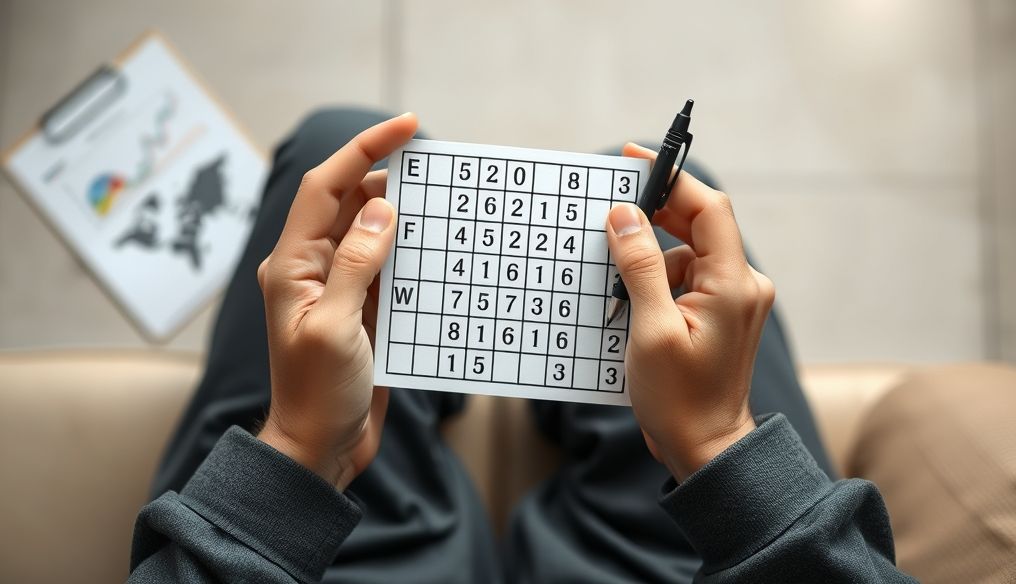Do Sudoku and Crossword Puzzles Really Strengthen the Brain and Protect Against Dementia?
Sudoku and crossword puzzles have long been considered entertaining and beneficial activities for the mind. But are they truly capable of strengthening the brain and protecting against neurodegenerative diseases like dementia? Let's explore the scientific evidence behind these claims.
What are Sudoku and Crossword Puzzles?
Sudoku: A logic-based number-placement puzzle where the objective is to fill a 9x9 grid with digits so that each column, each row, and each of the nine 3x3 subgrids that compose the grid contain all of the digits from 1 to 9.
Crossword Puzzles: A word puzzle that usually takes the form of a square or rectangular grid of white- and black-shaded squares. The goal is to fill the white squares with letters, forming words or phrases, by solving clues, which lead to the answers.
How are These Puzzles Supposed to Benefit the Brain?
These puzzles are thought to stimulate the brain in several ways:
- Improving Memory: Requires remembering rules and already entered words/numbers.
- Enhancing Focus and Attention: Needs complete concentration to successfully complete the puzzle.
- Developing Problem-Solving Skills: Requires logical and creative thinking to find solutions.
- Improving Processing Speed: With practice, the brain becomes faster at processing information and making decisions.
- Increasing Cognitive Flexibility: The ability to adapt to new tasks and think in different ways.
Scientific Evidence: What do Studies Say?
Numerous studies have investigated the relationship between cognitive activities like Sudoku and crossword puzzles and brain health. Some findings indicate:
- University of Exeter Study: Found that people who regularly engage in crossword puzzles have better brain function later in life.
- Rush University Study: Showed that participation in stimulating cognitive activities, including puzzles, may slow down the decline in memory and thinking with age.
- Meta-analysis: Of several studies showed that cognitive activities can reduce the risk of dementia by up to 30%.
Important Note: Despite these promising results, it is important to recognize that these studies do not necessarily prove a causal relationship. Other factors may play a role, such as a generally healthy lifestyle.
What are the Limitations of These Puzzles?
Despite the potential benefits, it is important to recognize that Sudoku and crossword puzzles are not a magic bullet for maintaining brain health. They have some limitations:
- Cognitive Specialization: These puzzles may improve specific skills, but they may not significantly affect other aspects of cognition.
- Boredom and Monotony: If the puzzles become boring, they may lose their effectiveness. It is important to diversify cognitive activities.
- Not a Substitute for Medical Treatment: These puzzles cannot replace medical treatment for neurodegenerative diseases.
How Can You Incorporate These Puzzles into Your Daily Routine?
If you want to take advantage of the potential benefits of Sudoku and crossword puzzles, here are some tips:
- Start Slowly: Choose puzzles that match your skill level and gradually increase the difficulty.
- Make it a Habit: Set aside a specific time of day to practice these puzzles.
- Variety: Try different types of cognitive games to keep the challenge and motivation.
- Enjoy: Most importantly, enjoy the process! If you are not enjoying it, you are unlikely to continue.
Other Activities to Strengthen the Brain
In addition to Sudoku and crossword puzzles, there are many other activities that can help strengthen the brain:
- Learning a New Language: Challenges the brain and improves memory and focus.
- Reading Books: Expands vocabulary and improves comprehension and focus.
- Regular Exercise: Improves blood flow to the brain and enhances cognitive functions.
- Healthy Diet: Provides essential nutrients for brain health.
- Adequate Sleep: Necessary for memory consolidation and brain repair.
- Social Interaction: Stimulates the brain and reduces the risk of dementia.
- Meditation: Reduces stress and improves focus and attention.
Conclusion
Scientific evidence suggests that Sudoku and crossword puzzles may be beneficial for brain health, but they are not a magic bullet. It is important to combine them with a healthy lifestyle that includes exercise, a balanced diet, adequate sleep, and participation in social activities. Remember that maintaining brain health is an ongoing process that requires conscious effort and commitment to a healthy lifestyle.




